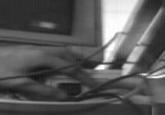| Navigation |
| About • Origin • Spread • Notable Examples • External References • Recent Images • Recent Videos |
About
The Trojan Room Coffee Pot is the world's first webcam prototype that was installed at the University of Cambridge to monitor the amount of coffee remaining in the brewing machine. Located in the "Trojan Room" within the university's old computer laboratory, the live feed system was implemented to save pointless trips to the coffee room by providing 128×128 grayscale images of the coffee pot in real time.
Origin
In the 1990's, the University's computer laboratory was a large seven-story building which housed approximately fifteen academics. There was only one coffeepot among them in the Trojan Room corridor and for some of the faculty members, getting coffee or refills involved a long trek across the campus buildings. In 1991, Quentin Stafford-Fraser and Paul Jardetzky, members of the "coffee club," used a functional video frame-grabber and a server program to capture the side profile of the coffeepot every few seconds. Stafford-Fraser subsequently built a client application for users to run on their remote computers, which displayed a 128×128 grayscale image of the coffee pot that was updated about three times a minute, according to the official homepage of Trojan Room Coffee Pot.

Called "XCoffee," the live feed was launched in 1999 and originally ran over Multi-Service Network Layer (MSNL) using a video capture board on an Acorn Archimedes computer.[2] When web browsers gained the ability to display images in March 1993, it was clear this would be an easier way to make the picture available. That November, the service officially moved to a website[3] built by Daniel Gordon and Martyn Johnson[4] and became the first live stream to broadcast online.
Spread
The team began attracting attention by January 27th, 1992 when Bob Metcalfe wrote about it in the now-defunct Comm Week.[1] On November 11th, 1994, BBC Radio Cambridgeshire reported on the coffee site. According to Stafford-Fraser[3], between 1993 and 1996, there was a "huge" amount of media coverage on the site, but they did not keep track of it and many news articles have since been removed. In 1996, the site had more virtual visitors than physical visitors to the King's College Chapel[13][3], making it the most-visited tourist attraction in East Anglia that year.
Shutdown
By March 19th, 2001, the coffee pot had over 2.3 million visitors and remained in operation.[5] That same year, it was announced by Cambridge officials the computer department would be relocating to a new building on the Cambridge campus, ceasing the need for the coffee pot camera. The site's shutdown garnered much more attention than the site had in the previous seven years. It was covered by the Communications of the ACM[6], ABC News[7], the Guardian[8], and Wired, even making it to the front pages of the London Times and the Washington Post.[9] The server was switched off for good on August 22nd, 2001, broadcasting a final image of the pot being unplugged.

eBay Auction
The coffee pot was auctioned off on eBay. It was won by the German daily news site Spiegel Online, who paid £3,350 pounds for the pot.[4] After the purchase, Krups refurbished the machine for free and it was turned on again, this time making coffee for Spiegel's editorial team. Spiegel set up a new feed, beginning in December 2001[14] which is still online.[15] They set up the coffee pot near a window, giving viewers a better view:

Notable Examples
- Professor Philip Watson from the University of Texas at Austin downloaded a picture of the pot every five minutes for a full day to test out MPEG encoding on the web.[10]
- On April Fool's Day in 1998, the Internet Engineering Task Force published a RFC (Request for Comments) entitled Hyper Text Coffee Pot Control Protocol[11][12], outlining the rules for coffee pots on the web.
- The coffee pot was parodied in the 2002 video game Hitman 2: Silent Assassin, in which users have to destroy a camera filming a coffee pot.[4]
External References
[1] The Trojan Room Coffee Pot – A (non-technical) biography
[2] The Trojan Room Coffee Machine – About this service
[3] The Story of the Trojan Room Coffee Pot – A Timeline
[4] Wikipedia – Trojan Room coffee pot
[5] Site Selection – Demise of Early Online Star -- a Coffee Machine -- Puts Web's Evolution in Perspective
[6] Communications of the ACM – The Life and Times of the First Web Cam
[7] ABC News – Plug Pulled on Web's Historic Coffeepot
[8] The Guardian – Plug pulled on web's historic coffee pot
[9] Status-Q – [untitled]
[10] Philip Watson via Wayback Machine – A Day In The Life Of The Trojan Room Coffee Machine
[12] Wikipedia – Hyper Text Coffee Pot Control Protocol
[14] Spiegel – Der Kaffee ist fertig: Das Comeback der Trojan Room Coffee Cam
[15] Speigel – Coffee Cam
Recent Videos 2 total
Recent Images 7 total
Share Pin










Comments ( 12 )
Sorry, but you must activate your account to post a comment.
Please check your email for your activation code.